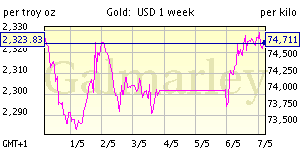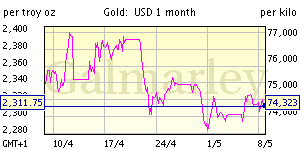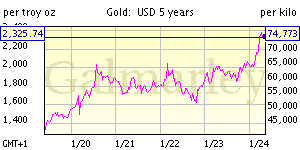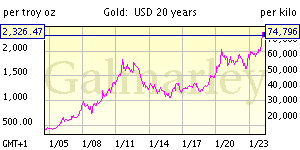The Story of Joseph—or—“Those Who Won't Learn From History . . . .”
excerpted from the November 13, 2010 edition of The International Forecaster
As a child, I attended Sunday School. I distinctly remember being taught the Old Testament story of Joseph (a son of Jacob). I was taught how Joseph had been sold by his brothers into slavery to the Egyptians back about BC 1700; how Joseph correctly interpreted two of the Pharaoh's dreams to mean that there would be seven wonderful years of plenty, followed by seven terrible years of famine; how Pharaoh made Joseph his second-in-command; how Joseph built granaries during the seven good years to store enough surplus grain to feed the Egyptian people during the subsequent seven bad years of famine. I was taught how Joseph saved the Egyptian people; that he was a great man and an extraordinary blessing to the people of Egypt.
I was much surprised to learn that my Sunday school's characterization of Joseph was perhaps not true. Joseph, as it turns out, was a diabolical cad who didn't save the Egyptian people, but rather used his foreknowledge of the coming famine and understanding of economics to subject the formerly free Egyptian people to slavery.
That's right. Long before the Egyptians enslaved the Hebrews, Joseph, the first Hebrew to enter Egypt, enslaved the Egyptians. So far as I know, Joseph was the world's first economist; our first “John Maynard Keynes”.
As you'll read from text in the Bible, Joseph was no hero—quite the opposite. More importantly, the story of Joseph shows that it was understood at least 3,700 years ago how to manipulate an economy so as to enslave an entire nation. And Joseph's story—openly published to this day in Chapter 47 of Genesis—has been ignored and overlooked by the world, for centuries.
The impact of Joseph's story and the world's failure to learn from that story is stunning. Chilling.
Truly, to understand the story of Joseph is to understand “what fools we mortals be”. Joseph's story may be the quintessential illustration of George Santana's observation that those who won't learn from history, are destined to repeat it. In fact,Americans (and even the world) appear to be repeating the story of Joseph, right now.
What follows are excerpts from Genesis, Chapter 47, and my observations:
“And there was no bread in all the land; for the famine was very sore, so that the land of Egypt and all the land of Canaan fainted by reason of the famine. And Joseph gathered up all the money that was found in the land of Egypt, and in the land of Canaan, for the corn which they bought: and Joseph brought the money into Pharaoh's house.” Gen 47:13-14
The seven bad years of famine had begun. But Joseph—contrary to the benign characterization I learned in Sunday school—did not provide free grain to the starving Egyptians. Instead, he sold the grain he'd accumulated during the 7 good years until he “gathered up all the money” and then brought all of it “into Pharaoh's house”.
Thus, in the first year of the famine, Joseph had
1) cornered the grain market;
2) sold grain to starving Egyptians for such a high price that he collected all of their money (silver);
3) deposited all the money into Pharaoh's coffers and thereby removed all the money from circulation in the Egyptian economy; and
4) exacerbated the famine by pushing the Egyptian economy into an economic recession and/or depression. I.e., if the Egyptians still had money in circulation, they might've been able to buy grain at better prices from foreign countries. They might've been able to work their way through the famine. But without food (grain) or money (silver), their economy collapsed, and they were trapped in the famine, trapped in poverty and absolutely dependent upon and subject to Joseph.
“And when money failed in the land of Egypt . . . all the Egyptians came unto Joseph, and said, Give us bread: for why should we die in thy presence? for the money faileth.” Gen. 47:15
Of course, the “money failed”. Why? Because Joseph had removed it from circulation and cached it away in the “Pharaoh's house”. By doing so, Joseph caused an economic collapse/depression that, in conjunction with the famine, subjected the Egyptian people to the fear of death by starvation. In that fearful condition, the Egyptian people became more easily enslaved.
The Egyptians understood that their money had “failed” but they apparently regarded this failure some sort of natural but inexplicable anomaly. They did not suspect that their money (and thus economy) had “failed” because Joseph had collected all of their money, removed it from circulation, and deposited that money with Pharaoh.
Coincidentally, our own government removed all the gold money from domestic circulation in A.D. 1933 and all the silver money in A.D. 1968. The vast majority of the modern world's gold (and much of the silver) has been deposited in the bank vaults of our modern “pharaohs” (governments and central banks). Thus, much like the Egyptians of 3,700 years ago, we too, have no real money in circulation. Interesting coincidence, hmm?
“And Joseph said, Give your cattle; and I will give you [grain] for your cattle, if money fail. And they brought their cattle unto Joseph: and Joseph gave them bread in exchange for horses, and for the flocks, and for the cattle of the herds, and for the asses: and he fed them with bread for all their cattle for that year.” Gen 47:16-17
Thus, in the second year of the famine, Joseph offered to supply the Egyptians with enough grain to survive for another year—provided that they surrender all of their privately-owned livestock (their primary means of production and wealth) to Joseph and Pharaoh. Joseph had parlayed control of the grain market into control of the nation's livestock (industry) and thereby reduced the Egyptian people to even greater poverty and dependence.
I'm cynically amused by Joseph's offer to sell grain to the people in exchange for all of their livestock “if money fail”.
If? If?!
By using the word “if,” Joseph implied to the Egyptian people that he, too, was shocked (“Shocked, I tell you!) and surprised by the strange disappearance of the money from circulation. But, Joseph knew the the money (the medium of exchange) had “failed” because he had personally caused it to fail by removing all of it from circulation and then depositing it within the Pharaoh's vaults. When Joseph offered to trade grain for livestock, he (much like Don Corleone in the Godfather) made the Egyptian people an “offer they couldn't refuse”.
Why couldn't they refuse? Because the Joseph knew that the people would be forced to either surrender their livestock—or die. That's an offer most cowards can't refuse.
Coincidentally, our government has entered into “Global Free Trade” treaties that reduced or eliminated our tariffs and caused many of our industries (our jobs and means of production) to leave the USA to relocate into third world nations. Much like the Egyptians of 1700 BC, we've also lost many of our jobs and means of production.
And don't forget that about one-sixth of all Americans are now on food stamps and/or welfare. Another sixth depend on Social Security. Thus, at least one-third of Americans are directly dependent on government for their survival—and that doesn't include those of us currently employed by and overpaid by government. Americans are not yet in circumstances as desperate as that of the ancient Egyptians, but we are similarly vulnerable to natural or contrived food shortages.
“When that year was ended, they came unto him the second year, and said unto him, We will not hide it from my lord, how that our money is spent; my lord also hath our herds of cattle; there is not ought left in the sight of my lord, but our bodies, and our lands: Wherefore shall we die before thine eyes, both we and our land? buy us and our land for bread, and we and our land will be servants unto Pharaoh: and give us seed, that we may live, and not die, that the land be not desolate. And Joseph bought all the land of Egypt for Pharaoh; for the Egyptians sold every man his field, because the famine prevailed over them: so the land became Pharaoh's.” Gen 47:18-20
Note that, prior to the famine, the Pharaoh was a “very important person” (probably something like the nation's “high priest”) but he wasn't a dictator. He didn't own all of the money, all of the grain, all of the land and all of the people.
However, thanks to the food shortage and Joseph's economic manipulations, the Egyptian people agreed to first give all their money, then all of their means of production (livestock), then all of their land, and finally themselves as servants/slaves to the Pharaoh.
Without mounting a military threat, without shooting one arrow, Joseph was able to single-handedly induce the Egyptian people to not merely consent to become the Pharaoh's slaves, but to initiate the offer to do so. Joseph didn't ask the people if they were would trade their land and bodies (personal freedom) for more grain. He simply waited for circumstances to grow so dire that the people had no option other than to prostitute themselves and sell their land to buy another year of life. The people, recognizing their hopeless condition, therefore invited Joseph to “buy us and our land for bread”.
Joseph accepted their offer, but it's inconceivable that Joseph didn't know all along that the people's desperation would drive them to “voluntarily” become slaves. Joseph simply created economic circumstances so desperate that the people—fearful of death—volunteered into bondage. The masses of people—who could've torn Joseph and Pharaoh apart with their bare hands—instead refused to fight and volunteered to become slaves.
Entering such servitude voluntarily is important. If Joseph had enslaved the Egyptians by force, they'd always be looking for an opportunity to slay him and regain their freedom. But by creating circumstances where the Egyptians voluntarily agreed to become slaves, Joseph was far less likely to ever be murdered in a revolt.
Joseph, my Bible school's purported hero, manipulated the Egyptian economy so as to cause a whole nation to consent to become slaves. I doubt that there's another comparable story or even myth in all of history. One man—Joseph— essentially engineered an unprecedented, unrivaled and extraordinary conquest an entire nation. This is the stuff of awe and legend.
And just to ensure that the slavery stuck, Joseph moved the people from their rural homes into the big cities:
“And as for the people, he removed them to cities from one end of the borders of Egypt even to the other end thereof.” Gen 47:21
City folk are packed so tightly and stressfully that they know they can't survive independently. They are natural dependents. They typically don't own their own land, and therefore won't fight to defend or retain it. So, even after the Egyptians agreed to surrender their land and their freedom to Pharaoh, Joseph apparently thought it prudent to move them off their former land so they didn't get any ideas about taking it back or reasserting their former independence.
(Curiously, the UN's “Agenda 21” (like Joseph) also proposes to remove all Americans from rural areas and force us all to live in a relatively few major metropolitan cities. Another interesting coincidence, hmm?) Having urbanized all the people, Joseph then offered to seemingly do them a favor:
“Then Joseph said unto the people, Behold, I have bought you this day and your land for Pharaoh: lo, here is seed for you, and ye shall sow the [Pharaoh's] land. And it shall come to pass in the increase, that ye shall give the fifth part unto Pharaoh, and four parts shall be your own, for seed of the field, and for your food, and for them of your households, and for food for your little ones.” Gen 47:23-24
Note that once the people had surrendered all of their money, livestock, land and freedom to buy seed/grain so that they might survive, Joseph then offered “free” seed to anyone who would plant and work the Pharaoh's land.
Implication?
There was never a real grain shortage. Joseph could've given the people free grain in the first year and let them keep their money. He could've given them free grain in the second year and let them keep their livestock and free grain in the third year and let them keep their land and freedom. But instead, Joseph artificially restricted the supply of grain so he could sell under such terms as to slowly put the people into poverty and then bondage.
By anticipating the famine and cornering the grain market, in just three or four years of famine, Joseph had captured all of the money, livestock, land and the people's former freedoms. And then, Joseph put the unemployed city dwellers back to work on the land they used to own, raising crops that used to be their own, on condition that they give 20% of whatever they earned to Pharaoh.
Thus, Joseph became father of the world's first income tax. Some “hero,” hmm?
Punchline:
“And they [the Egyptian people] said, Thou hast saved our lives: let us find grace in the sight of my lord, and we will be Pharaoh's servants.” Gen 47:25
The darn fool Egyptians were too ignorant or gutless to see that they'd been hustled, conned and subjected to slavery by Joseph. Instead, those mindless cowards were actually grateful to Joseph. They thanked their oppressor for “saving” them when he had, in fact, been instrument of their enslavement. The ancient Egyptians' incredible, self-destructive ignorance and cowardice is frightening. And yet, 37 centuries later, what's changed? How are today's Americans one whit smarter than the cowardly Egyptians of 3700 years ago?
The Bible—the Bible!—which could be read by common people for most of six centuries . . . offers a comprehensive, step-by-step “How To Do It” guide for conquering a nation and subjecting its people to slavery by means of economic control rather than open war . . . and yet not one man in 100,000 has read and understood that lesson. Not one man in 100,000 has appreciated how dangerously, selfdestructively “natural” it is for people to “thank” (rather than fight) the very adversaries who rob them of their property and their freedom.
In the context of history, the story of Joseph is chilling. As a species, mankind seems determined to welcome our own servitude. As a species, we seem almost innately blind to economic forces that would enslave us. We can all see guns, and bullets, and war—but almost none of us can see economics.
And here we are today—without money, with diminishing means of production, with only equitable title to our land and deemed to be fiduciaries (employees) to our government by means of Social Security Numbers, and increasing dependence on government for our food—and watching ourselves slowly slide deeper into the same bondage that Joseph once imposed on the formerly free Egyptians.
Will we learn to recognize and fight our economic oppressors? Or will we, like the ancient Egyptians, also soon come to thank and praise those responsible for our enslavement?
![[Most Recent Quotes from www.kitco.com]](http://www.kitconet.com/images/quotes_7a.gif)






